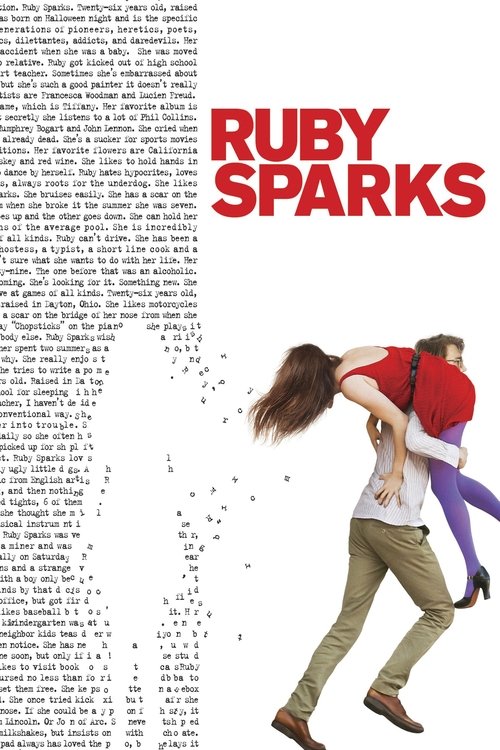
Title: Ruby Sparks
Year: 2012
Director: Jonathan Dayton
Writer: Zoe Kazan
Cast: Paul Dano (Calvin),
Zoe Kazan (Ruby),
Chris Messina (Harry),
Annette Bening (Gertrude),
Antonio Banderas (Mort),
Runtime: 104 min.
Synopsis: Calvin is a young novelist who achieved phenomenal success early in his career but is now struggling with his writing – as well as his romantic life. Finally, he makes a breakthrough and creates a character named Ruby who inspires him. When Calvin finds Ruby, in the flesh, sitting on his couch about a week later, he is completely flabbergasted that his words have turned into a living, breathing person.
Rating: 7.115/10
The Fragile Alchemy of Love’s Creation: Unraveling Ruby Sparks
/10
Posted on July 19, 2025
In Ruby Sparks (2012), directors Jonathan Dayton and Valerie Faris craft a delicate yet incisive exploration of love, control, and the act of creation, blending whimsical romance with unsettling psychological depth. The screenplay, penned by Zoe Kazan (who also stars as Ruby), is the film’s beating heart, weaving a narrative that oscillates between playful fantasy and raw introspection. Kazan’s script probes the ethics of authorship, asking whether we can truly love what we seek to control, a question that resonates beyond the writer’s desk to the messiness of human relationships. Calvin (Paul Dano), a novelist grappling with writer’s block and loneliness, conjures Ruby, his dream girl, into existence, only to confront the moral quagmire of manipulating her agency. The premise, while fantastical, grounds itself in universal truths about projection and possession, making the film a sharp allegory for the creative process and romantic idealization.
Dano’s performance as Calvin is a masterclass in understated complexity, his awkward charm masking a subtle narcissism that unravels as the story darkens. Kazan, as Ruby, balances effervescence with vulnerability, her character’s shifts from manic pixie dream girl to a figure asserting her own identity both heartbreaking and empowering. Their chemistry, rooted in real-life partnership, lends authenticity to the film’s emotional stakes. However, the supporting cast Annette Bening and Antonio Banderas as Calvin’s bohemian mother and her lover feels underutilized, their scenes charming but tangential, as if the script couldn’t fully integrate its own subplots.
Visually, Matthew Libatique’s cinematography bathes the film in a warm, almost dreamlike glow, with Los Angeles serving as both a sunlit backdrop and a metaphor for Calvin’s insular world. The camera’s intimate framing during Ruby’s “creation” scenes contrasts sharply with wider, more claustrophobic shots as Calvin’s control tightens, a visual language that mirrors the narrative’s emotional arc. Nick Urata’s score, however, occasionally leans too heavily on quirky indie tropes, risking tonal distraction in moments that demand more restraint.
The film’s third act, while bold, stumbles slightly, rushing toward resolution where a slower unraveling might have deepened its impact. Nevertheless, Ruby Sparks succeeds in its refusal to offer easy answers, challenging viewers to confront their own fantasies of control. It’s a film that lingers, not for its perfection, but for its fearless dissection of love’s imperfections.
0
0
